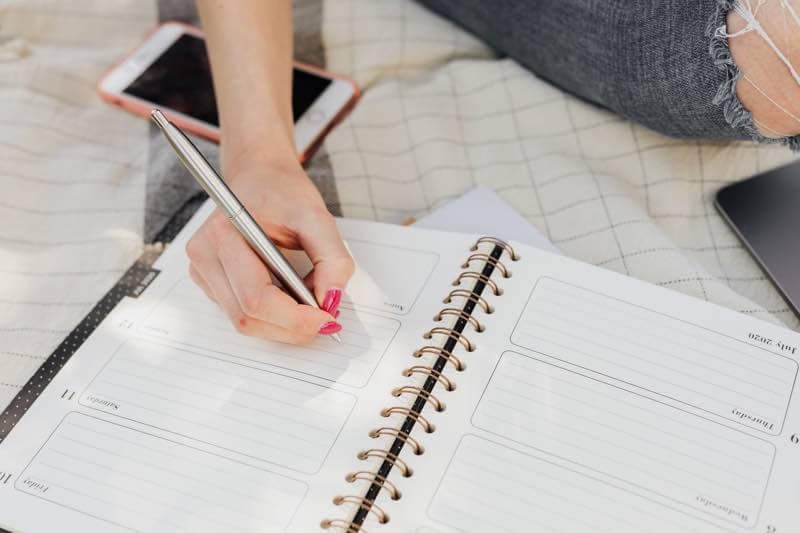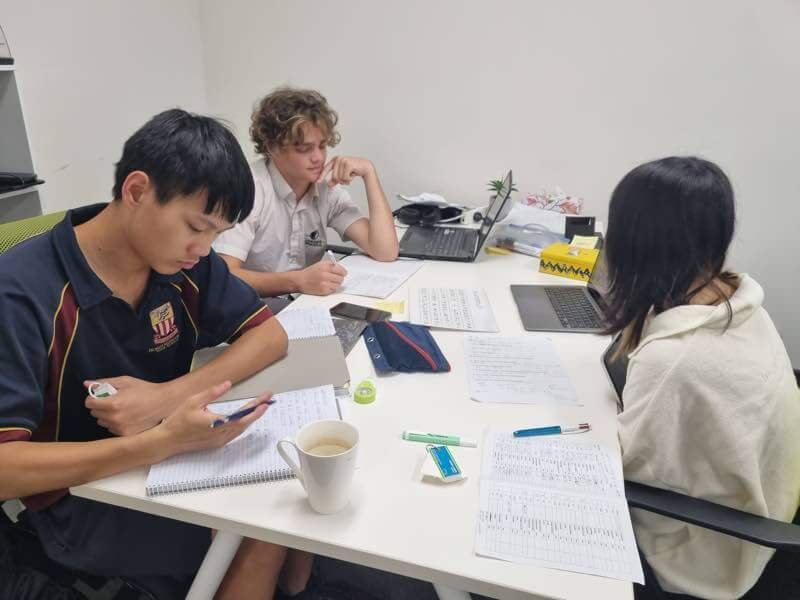
How to Study Effectively this Autumn School Holiday 2023

Eesha
English Tutor @YK Education
- 7 min read
When I was in high school the approaching term break felt like an endless expanse of time.
I would begin my school holidays with a massive list of my holiday homework; the assignments I needed to prepare for, the notes I needed to catch up on, and the texts I needed to have read. By the end of the holidays I would have done… well nothing. The days would pass by in a blur, the towering list of tasks would constantly be pushed back to the next day and the seemingly endless block of time I had at my disposal turned out to be disappointingly finite. By the time I reached Year 12 I realised I needed to seriously improve my productivity. But how can we find the self-motivation to study when our time is entirely unstructured? Fortunately, there are ways to improve productivity and make the most of the school holidays. Here’s how to create a study structure, break down your study load into manageable chunks, and stay motivated to get the most out of this holiday!
How to create a study structure
1. Create specific goals
To create your study schedule you will need to set specific goals for what you want to achieve during the holidays. This could include studying for a particular subject, completing an assignment, or working on a personal project. Once you have your goals you can develop a study plan that outlines what subjects you need to study and when. Allocate achievable time slots for each subject and make sure you leave plenty of room for study breaks!
2. Make those goals realistic
Set realistic and measurable goals to complete: Make sure your goals are realistic and achievable within the time you have allotted. Rather than ‘study two hours of Maths today’ or ‘read prescribed English text for ninety minutes’, say something like ‘Finish exercises 5E and 5F for Maths’ or ‘Read chapters 1 and 2 for my prescribed text’. This will help you to keep track of your progress and ensure that you are using your time productively instead of just constantly staring at your clock waiting for time to pass (we’ve all been there!).
3. Building in flexibility
When creating your schedule, leave some wiggle room for unexpected events or changes in plans. This can help you to adapt to changes without derailing your entire schedule. You never know what exciting plans might pop up at the last minute during the holidays!
4. Finding a study space
Your study space should be a place where you can focus; quiet and comfortable, with access to the internet and minimal distractions. You won’t get anything done studying on your bed. Think carefully about where you study best. If you prefer to study in a familiar environment, why not tidy up a desk at home, to make it a more enticing place to study.
If, like me, you’re incapable of focusing when in the comfort of your own home, why not try studying in an outside environment like a public library or cafe? Better yet, you can come straight to YK for a quiet and focused study environment. You could even try alternating between study spaces to make your experience varied and exciting.
Whichever study space you choose, make sure it’s in an area where you feel comfortable and motivated to do your best work! Once you have a structure in place, it’s time to break down your study load into manageable chunks of work.

How to break down your study load
1. Review and Revise Past Material
You’re probably thinking “How will I possibly revise 10+ weeks of content by myself within 2 weeks whilst still enjoying the holidays?”
2 weeks may seem like a short period of time to unpack and revise 10 weeks worth of class content covered during the school term, but with clever thinking and planning you can end your holidays refreshed and prepared for term 2! Firstly, try reading or summarising your notes from the past term to try and identify areas where you may need practice or clarification.
Keep reading to learn more about key tips for your subjects.
2. Read the Syllabus
As a NSW high school student, your syllabus acts as a roadmap to help you navigate and ace your assessments. A strong understanding of all parts of your syllabus means that you will know what to expect during your exams. Even if you are not sitting the HSC this year, this is a great habit to start implementing for Year 7-10 students.
For our HSC Maths students, find the links to your relevant subject here:
NSW Maths Standard Syllabus
NSW Maths Standard Formula Sheet
NSW Maths Advanced Syllabus
NSW Maths Advanced Formula Sheet
NSW Maths Extension 1 Syllabus
NSW Maths Extension 1 Formula Sheet
For our HSC English students:
In senior years, reading and understanding the syllabus is integral to crafting a Band 6 essay. Try summarising the rubrics of past and upcoming modules into concise and digestible dot points to fully grasp the key concepts of each topic.
You can find the links to your relevant English subject here:
NSW English Standard
NSW English Advanced
For our HSC Japanese students, you can find the relevant links here:
Japanese HSC Japanese Continuers
HSC Japanese Extension 1
3. Practice past exam papers
Practice past exam papers to get a feel for the format of the exam and the types of questions that may be asked. This will help you to identify areas where you need more practice. Whilst you complete these exams try stimulating the exam environment. Find a quiet place to study with no distractions, set a timer and begin. This will be especially helpful if you’re a student who finds themselves constantly under pressure during exams.
NSW English Standard 2022 HSC Exam Pack
NSW English Advanced 2022 HSC Exam Pack
NSW Maths Standard 2022 HSC Exam Pack
NSW Maths Advanced 2022 HSC Exam Pack
NSW Maths Extension 2022 HSC Exam Pack
NSW Japanese Beginners
NSW Japanese Continuers
NSW Japanese Extension
4. Get ahead on coursework
If you know what material will be covered in upcoming lessons or courses, use the holidays to get a head start on reading or research. This can help you to better understand the material when it is presented in class and give you a head start on any assignments.
5. Quiz yourself to identify knowledge gaps
Test yourself on the material to see how well you understand it. This could involve taking practice quizzes or tests, writing essays or summaries. A fun way to revise content might be gathering a group of study buddies and taking turns teaching each other a topic.
Finally, how to stay motivated:
1. Create a list of the specific tasks that need to be completed these holidays and the estimated completion time. When I was studying for the HSC, often times at the end of a “long and strenuous” study day I would feel productive as I completed “4 hours of content revision for maths” or I “read my prescribed text for 2 hours”. However, when I looked back at the actual work I had completed there wasn’t much.
This is because the goals I had set were not specific which led me down a spiral of focusing my time on unnecessary things and robbing me of free time that I could have spent elsewhere.
2. Make textbooks/theory books/worksheets easily accessible by saving shortcuts on your computer or considering the positioning in your room. As someone who constantly found themselves pushing studying for Maths till the end of the day – which in the end there was no time for.
I found that by leaving my textbooks in the centre of my desk the night before forced myself to start with Maths before moving on. It might seem silly but small actions like these can actually make a big difference!
3. Save or print relevant resources like the Maths formula sheet (Standard , Advanced & Extension), Prescribed Japanese Kanji list, English rubric terminology. I found that when I already had the relevant resources on me at all times, finding the motivation to study was a lot easier as the inconvenient task of setting up was already eliminated.
4. Organise your stationery to include highlighters, different coloured pens, post-it notes, a calculator, a ruler, and any other necessary stationary. By using materials that I was comfortable with and enjoyed using allowed me to bring some more fun into my study sessions.
5. Use a scheduling system like Asana, a diary, or a whiteboard.
6. A file organisation system like Google Drive and/or Notion. In an attempt to avoid endlessly scrolling through TikToks and my Instagram feed during Year 11 and Year 12 I started spending my breaks mastering how to customise my Notion page and making my notes look aesthetically pleasing.
I have to admit, in a way it was another form of procrastination but having this little hobby and having organised notes made studying feel so much more fun for me – I still do this going into my third year of university.
7. List of favourite rewards and an estimated time (e.g. go for a walk to the shops and get Chatime (1 hour), watch a 15 minute Youtube video, watch one episode of anime (20 minutes)) I found it hard to focus at home so I would often go to the library with friends to keep each other accountable. However, this led to an even bigger problem… 2 hours in the library would pass and the only thing that we would have achieved was figuring out what we should grab for lunch.
So in order to combat this, my friends and I would set up a timer for around an hour. Within this hour no one was allowed to speak or interact with each other and then if we had successfully completed an hour of study we would talk for 10 minutes, maybe grab a snack and do it all again.
8. Set up your study space at home. Just due to the nature of Autumn school holidays I found it so hard to concentrate at the desk in my room. Maybe it was because the colder weather was making me feel lethargic or maybe it was because my bed was literally 2 metres from my desk.
Although I did prefer studying outside, I found that whenever I had to study at home it was much less distracting for me to study at the dining table.
Here are other options you might like to explore:
1. Pick your favourite cafe or library
2. Organise a study group
3. Create Flashcards
https://ankiweb.net/shared/decks/
https://quizlet.com/latest
4. Download the Pomodoro app
5. Create a playlist to get you in the mood and mindset to study.
Get more study tips
Receive monthly study tips and educational content that will help you ace your final years of High School!
Thank you!
You have successfully joined our subscriber list.
YK Education Copyright 2023


